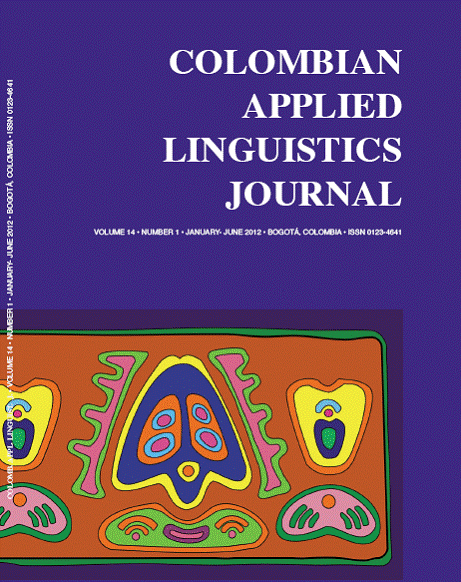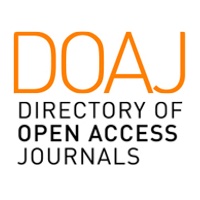DOI:
https://doi.org/10.14483/22487085.3809Published:
2012-06-29Issue:
Vol 14, No 1 (2012) January-JuneSection:
EditorialEditorial
Keywords:
editorial (en).Downloads
References
Canagarajah, S. (2005). (Ed.). Reclaiming the Local in Language Policy and Practice. Mahwah, New Jersey: Lawrence Erlbaum.
Castañeda-Peña (2012). Profiling academic research on discourse studies and second language learning. Colomb. Appl. Linguist. J. 14.2. pp. 9-27
How to Cite
APA
ACM
ACS
ABNT
Chicago
Harvard
IEEE
MLA
Turabian
Vancouver
Download Citation
Editorial
For the celebration of twenty years of our graduate program in Applied Linguistics to Teaching English as a Foreign Language in Colombia, we have prepared this special issue that contains reports of research carried out by faculty and graduate students on issues related to Discourse Analysis (DA) in Educational Contexts. Putting together an issue on this recently introduced domain of applied linguistics in our program was an interesting, yet very challenging one-year project for both writers and the editorial team. We aimed at having graduates from the program who have done research on DA during the last 4 years, prepare a manuscript to share with the local, national and international audience of the Colombian Applied Linguistics Journal. We sent out the invitation to the academic community in April 2011 and received a good number of articles. The abstracts of these submissions were evaluated by the editorial committee, initially and those that were approved were sent out for double blind peer evaluation. As a result, 11 articles were approved for publication in this issue.
As mentioned above, discourse studies in educational contexts is a recent area of research that has been explored over the past four years in the Master's Program by three faculty members. Castañeda-Peña, one of the faculty leading the DA seminars, uses a regional perspective to introduce studies related to different aspects of discourse analysis in foreign language classrooms that were carried out by teacher researchers in the Hispanic world and locally. Reviewing these studies, he considers that "via the lenses of Critical Classroom Discourse Analysis (CCDA) it is possible to pinpoint instances where language learners' identities, gender, and power relations profile classroom interaction (reconstructing a sense of community"
Since the emphasis in this special issue is on local understandings of DA, and Critical Discourse Analysis CDA, Canagarajah's (2005) ideas are relevant to support our purpose that "in providing a more pronounced place for the local disciplinary discourses, we envision a shift in our practices of knowledge-making" (p.26). In this regard, Castañeda-Peña, invites EFL educators to consider the study of classroom discourses from nontraditional points of view and he maintains that "within a CDA framework... language learners do not learn a code in the language classroom simply with a purpose of correctness, rather it should be understood that language learners view reality critically and exert agency in relation to their social realities differently"
He considers that studying classroom interactional behavior can inform the ELT community about second language learning processes and second language use. He also considers that gendered identities are multiple and they are present in the language classroom affecting second language learning processes either positively or negatively as language learners position each other differently. would like to take this opportunity to join both Castañeda-Peña and Canagarajah in an invitation to Colombian language teachers and teacher educators to consider making a change in our practices taking into account the challenges we may encounter, and thus widen our traditional perspectives to language learning and teaching to critically include issues of gender, power relations and interactional behaviors in planning their teaching and studying the outcomes of learning in EFL classrooms. I also want to invite all our readers to explore the different perspectives to Discourse Analysis in EFL classrooms and educational contexts presented in the articles in this issue. We hope the diversity of the positions taken, lives up to your expectations.
References
Canagarajah, S.(2005).(Ed.). Reclaiming the Local in Language Policy and Practice. Mahwah, New Jersey: Lawrence Erlbaum.
Castañeda-Peña (2012). Profiling academic research on discourse studies and second language learning. Colomb. Appl. Linguist. J. 14.1. pp. 9-27.
Amparo Clavijo Olarte
Editor
Metrics
License
This work is licensed under a Creative Commons Attribution-NonCommercial-NoDerivatives 4.0 International License.
Attribution — You must give appropriate credit, provide a link to the license, and indicate if changes were made. You may do so in any reasonable manner, but not in any way that suggests the licensor endorses you or your use.
NonCommercial — You may not use the material for commercial purposes.
NoDerivatives — If you remix, transform, or build upon the material, you may not distribute the modified material.
The journal allow the author(s) to hold the copyright without restrictions. Also, The Colombian Apllied Linguistics Journal will allow the author(s) to retain publishing rights without restrictions.













.JPG)










